|
|
|
Page No - 1
|
|
Goto Page No. 1 2
3 4
|
|
|
MSSO NEWS - 1999
|
|
|
|
Editor: Eilish Hiebert
|
|
|
|
|
|
|
|
CIDA Assessment of MSSO
|
|
The purpose of the assessment was to provide Canadian International Development Agency
(CIDA) with a better understanding of MSSO's strength and sustainability as an organization. The assessment was
carried out by Susanne Duska, an independent consultant appointed by CIDA. Relevant documents, stakeholder interviews,
a field trip to Maharashtra and running dialogue with MSSO and CIDA's NPF division were the main sources of information
for this assessment. The fieldtrip in Maharashtra involved interviews with over 100 stakeholders and site to site
travel totaling 4000 km, August 19 to September 1, 1999. A visiting team including CIDA and MSSO representatives
shared interview tasks, based on a checklist of questions by project and category of informant, which was developed
for that purpose. The following is a brief summary of the report submitted by Susanne Duska.
|
|

|
|
ABOUT MSSO
|
|
MSSO's wide embrace is reflected in a general mandate compatible with CIDA principles. It has tended to rally
to the cause of partners rather than superpose its own specific objectives. The projects it funds are diverse,
while stressing skills training and income generation. Often projects are innovative, sometimes even on the cutting
edge of social
|
|

|
|
|

|
|
|
MSSO gratefully acknowledges
assistance of the following in the production of MSSO News
|
|

|
|
|
CANADIAN INTERNATIONAL DEVELOPMENT
AGENCY
200 Promenade du Portage, Hull, Que., Canada K1A 0G4
|
|

|
|
|
POLYPHASE ENGINEERED CONTROLS
LTD.
3555 - 93 Street, Edmonton, AB, Canada T6E 6N6
|
|

|
|
|
RICHMOND PRINTING & SPECIALTIES
INC.
#10, 3803 - 26 Avenue SW, Calgary, AB, Canada T3E 6V7
|
|

|
|
|
|
|
activism. Several target severely disadvantaged groups with attendant high risk in terms of development outcomes
and sustainability.
|
|

|
|
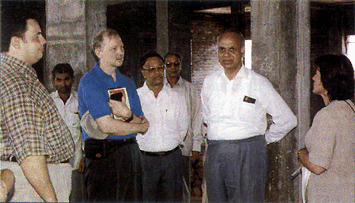
|
|
Assessment team members at the hospital site Muroe Pace, David Oke, Jagannath
Wani and Susanne Duska with Gopal Kele and Abhaychand Shah in the background
|
|

|
|
MSSO enjoys a broad base of support and has consistently been in a strong financial
position. Donors can be mobilized across the country according to need, their numbers typically varying between
60 and 150. MSSO's call for disaster relief after a 1993 earthquake in Latur, Maharashtra, for instance, brought
response from an unprecedented 1300 donors. Since 1985 MSSO has raised over $741,335 through various activities.
Added to these funds are contributions by the Alberta Wild Rose Foundation, which have totaled $258,530 over the
past eleven years. The combined cumulative total, close to $1,000,000 ($999,865 to be exact), received just over
$1,000, 000 in matching funds from CIDA. The matching funds have increased MSSO's direct contribution to international
development projects to $1,680,672.
|
|

|
|
From among its donor-members MSSO has also been able to rally up to 100 volunteers, depending on the nature
of activities requiring help. Each casino event for example requires up to 70 volunteers. Large numbers of volunteers
|
|
|
|
|
|
|
|
|
Page No - 2
|
|
Goto Page No. 1 2
3 4
|
|
|

|
|
|
|
|
also came forward for the hosting of visiting Indian partners in 1994, 1997, 1998 and
1999.
|
|
Since the beginning, Dr. Wani has coordinated the participation of large numbers of supporters and resources
with only occasional assistance from part-time consultants for accounts, administration and publications. Dr. Wani
is a networker par excellence and the organization has evolved out of this strength. With his home as office, overheads
are kept to a minimum. Dr. Wani, himself unpaid, squeezes value out of every dollar even to the extent of capitalizing
on foreign exchange fluctuations and higher interest rates in India where possible.
|
|
An avowed perfectionist who also needs freedom to maneuver, Dr. Wani was not enthusiastic at suggestions that
paid administrative back up might be beneficial. His concerns included: cost, difficulty of finding capable persons
and the risk of training a competent young person who is likely to move on before adding real value to the organization.
|
|
MSSO's public engagement activities in Canada have been successful in moving people from awareness to personal
involvement as donors, volunteers and even initiators of new activities in support of development. It has sponsored
a series of cross-country discussions around the visit of NGO partner representatives in 1994, 1997, 1998 and 1999.
MSSO has produced annual newsletters of high quality, two videos that feature success stories and a 56-page decennial
publication. Given the quality of these materials and their value for a development education initiative, MSSO
should perhaps give more deliberate attention to a strategy of distribution.
|
|
It is worth mentioning that public awareness raising activities such as these have actually moved individuals
to become personally involved. Aside from attracting new donors and volunteers, MSSO has recently been approached
by two young Canadians looking for volunteer service opportunities with its overseas partners. The candidates have
raised their own funds for travel and living expenses. MSSO has arranged for a six-month assignment with Swa-Roop
Wardhini, at an MSSO-assisted training center for slum children.
|
|
Finally, development is a risky proposition whether it is undertaken by Bilateral, Multilateral or Partnership
programs. Viewed against that backdrop, the bottom line is that NPF's partnership with MSSO delivers reasonable
value for CIDA's development dollar. CIDA's funds are well leveraged with MSSO's share and local contributions
in cash or kind. Beyond that, it is important to recognize the enormous unmeasured, non-monetized effort of the
many stakeholders committed to each of MSSO's projects.
|
|
MSSO has grown far beyond its original expectations of membership support and activity spread. There can be
no question that MSSO has given many dedicated organizations a chance to further their development objectives in
a way that is compatible with CIDA's ODA priorities. It has been persistent in seeking out innovative ways to make
projects sustainable. It has tried to instill this principle, and that of gender equity into its partners' way
of thinking. It is always alert to new opportunities that fit with its overall objectives and, in that sense, is
energetic, pro-active and decisive in making potentialities happen.
|
|
|
|
ABOUT THE PARTNERS
|
|
Many Canadian NGOs partner primarily with one Southern NGO and build that relationship over a long period of
time. MSSO has worked with almost 50 different NGOs. It therefore makes sense to ask if it has a sound strategy
for ensuring that, project merits aside, the partners are credible. During the field mission I asked various informants
what criteria should govern the choice of a good partner. There was consensus to a surprising extent on selection
criteria which included:
|
|
Commitment, dedication and integrity, judged by:
|
|
|

|
the level of self-sacrifice
|
|

|
the level of volunteerism
|
|

|
the length of time devoted to a given cause (constancy of vision);
|
|
|
Ability to identify with the beneficiaries, judged by:
|
|
|

|
the match between beneficiary needs and project goals
|
|

|
the level of trust between workers and beneficiaries;
|
|
|
Based on these indigenous views, there is no question that the key implementing organizations get top marks
for almost everything. The lead figures in these NGOs are well educated; they have donated not only substantial
energy with nominal remuneration but also contributions in cash or kind. They have a long record of dedication
to their target community, be that the tribals, the devdasi, marginal farmers or the mentally challenged. By their
own level of self-sacrifice and integrity, they have inspired a high level of volunteerism as well as of beneficiary
trust. Moreover, they are very capable, very experienced individuals with a capacity for resourcefulness and innovation
that may yet surprise us when it comes to dealing with the challenges facing each project.
|
|
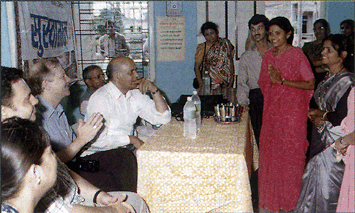
|
|
Assessment team members in discussion with reintegrated hearing impaired
|
|
ABOUT OUR PROJECTS
|
|
The four projects reviewed represent different stages of completion, different sectors
of activity and different levels of development challenge. The following is a summary of their effectiveness and
sustainability, as this ultimately informs our assessment of MSSO and its partners in India.
|
|
TRIBAL MIDWIFE TRAINING: This three-year current project has by far the largest budget among the four
reviewed. Its intent was to improve the health standards of tribal people in the Dhule District through a program
of midwife training.
|
|
|
|
|
|
|
|
|
Page No - 3
|
|
Goto Page No. 1 2
3 4
|
|
|

|
|
|
|
|
Encouraging results are apparent in the 104 village midwives now trained by Vanwasi Kalyan Ashram. Beneficiaries
have bought into the new learning and enjoy a higher status in their communities as a result. Trainees are applying
improved hygienic standards and are more confident in recognizing high-risk cases that need to be referred to Primary
Health Centers. It is also significant that the midwives are eager for more training. Interviews confirm that this
project has rallied top-notch commitment and capability.
|
|
To buffer the project against the unpredictability of access to a hospital for hands-on
training, MSSO proposed to CIDA that funds earmarked for construction be used to build a maternity hospital. This
would not only give the project an institutional home but also a means of subsidizing it through income generating
services. Construction of the hospital is now proceeding rapidly but there is no business plan to support sustainability
expectations. MSSO and its partners are aware of the dilemma and are confident that these uncertainties will be
resolved in the near future.
|
|
EARTHQUAKE: The idea to establish an oil mill came directly
from the local farmers. Moving them from that point to a willingness or confidence to take responsibility as a
collective has been a long and nurtured process. Manavlok, the implementing NGO, is just now registering a cooperative
of farmers, with roughly 560 members, of which some 70% are women.
|
|
The mill itself has been operating for almost two years. Interviews with male and female
farmers confirm that benefits have definitely flowed into the community as a result of the mill. These include
confidence in the quality of oil, higher yields from the crushed seeds, lower extraction fees, convenient location
and access to revolving loan fund for seed and fertilizer.
|
|

|
|
There is room for confidence, however, in Manavlok's genuine commitment. It has a long
track record, not only in empowering the poor for self-help, but also in strengthening the role of women through
a variety of training and micro-credit schemes.
|
|
DEVDASI REHABILITATION: The term devdasi refers to young girls dedicated to deities at puberty and essentially
cut loose from all rights to family or community belonging. Found mostly in backward communities, the practice
condemns its victims to a life of begging, prostitution or slave labor, while allowing the family, as well as unsavory
elements, to exploit their existence. Fighting for this cause requires tenacity and courage to affect attitudinal
change while giving devdasi a better way of supporting themselves.
|
|
Devdasi Rehabilitation project in fact exceeded its promise of results within the term of the Contribution Agreement.
Generous donations of land and labor made it possible to build a much larger and separate facility in Karve where
the concentration of devdasi was higher. The numbers trained were 66% above what was targeted. Results at the outcome
level were already becoming evident. Several devdasi embarked on small tailoring businesses using the center's
sewing machines, or obtained employment with established
|
|
|
|
tailors. They were slowly gaining a sense of confidence and an ability to distinguish between rightful and wrongful
treatment as human beings.
|
|

|
|
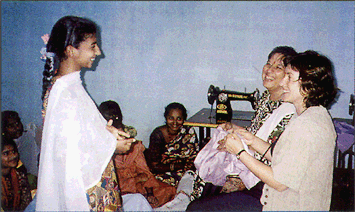
|
|
Uma Thakor and Susanne Duska in discussion with a trainee at the vocational
training centre run by Utthan
|
|

|
|
Dr. Gasti, the project coordinator, is trying to mobilize funds and has a strong volunteer corps at the ready,
trained for the delicate task of interfacing with the families of the devdasi and the surrounding community. Interviews
with devdasi suggest that they too are cautiously hopeful and motivated to follow the path to rehabilitation that
Utthan has laid out for them. Bringing devdasi to this point is itself a major achievement.
|
|

|
|
REHABILITATION OF MENTALLY CHALLENGED: This project was designed to answer to the needs of rural children
by establishing a residential school and sustainable farming operation that would allow them to develop skills
appropriate to their home communities. The concept is novel. It also targets a beneficiary group that suffers a
double disadvantage. The rural poor have no access to special needs schooling and prevailing attitudes to disabilities
are particularly harsh.
|
|
It is early to speak of project achievements, as such. The foundation stones have been laid for the residential
facility; school walls have gone up; a harvest of corn has been sold on the market, with involvement of children
from the existing day school. There is no question that Prabodhini Trust uses the funds conscientiously, for an
eminently good cause.
|
|
|
|
Visit of MSSO Indian NGO Partner
|
|
In the months of June and July Mrs. Rajani Limaye, the coordinator of MSSO's Rehabilitation Program for Mentally
Challenged at Prabodhini Trust, visited Ottawa, Toronto, Winnipeg, Saskatoon, Edmonton, Calgary and Vancouver.
She also made a presentation at BMM 99, the biennial convention of Brihan Maharashtra Mandal held in San Jose.
The convention was attended by 4,300+ Marathi speaking persons mainly from North America.
|
|
In each city on her itinerary, she visited facilities for mentally challenged and exchanged information with
the parents and administrators. The information will be useful to implement new programs at Prabodhini Trust.
|
|
|
|
|
|
|
|
|
Page No - 4
|
|
Goto Page No. 1 2
3 4
|
|
|

|
|
|
|
|
Mrs. Limaye's visit was part of MSSO's Public Engagement program to create awareness
about international development issues. She addressed public meetings and at these meetings screened MSSO's newly
published video: Gautam's Mother scripted and directed by Sumitra Bhave and Sunil Sukhtankar. The duo has won several
awards nationally and internationally for their productions. No wonder Gautam's Mother received high acclaim from
the audience.
|
|

|
|
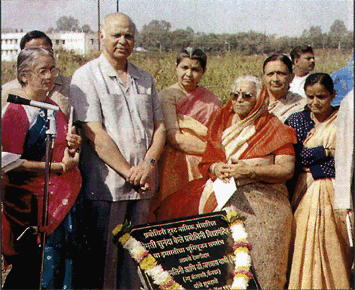
|
|

|
|
Jagannath and Kamalini Wani at the ground breaking ceremony of the school
building for mentally challenged with Mrs. Rajani Limaye (left) and Mrs. Kamalabai Sarda (right)
|
|

|
|
Couple Volunteers for NGO Partner
|
|
The Public Engagement program of MSSO is having an impact on youth. Sonal and Nilesh Kavia, a young Calgary
couple, came across our publication A Decade of Partnership in Development (1985-1995). It roused their interest
in the work of MSSO and they wanted to know more about it. They got hold of our annual newsletters, MSSO NEWS,
for the last three years. In the newsletters they came to know of existence of our videos: (1) Three Faces of Tomorrow
and (2) The school that Gautam's Mother Built. They watched the videos and decided to volunteer for Swa-Roop Wardhini,
one of the MSSO partners in India. Swa-Roop Wardhini is actively involved in personal development of slum children
in Pune. One of their success stories, based on a life of a slum girl, is included in Three Faces of Tomorrow.
|
|

|
|
The interest of Sonal and Nilesh did not stop there. They introduced MSSO to more than 70 of their friends and
colleagues and raised $3,788 to help slum children served by Swa-Roop Wardhini. They left for India on 22 October
1999 and shall work with Swa-Roop Wardhini for a period of three months. Later they will visit other MSSO projects
for children.
|
|

|
|
MSSO Success Stories on a Video
|
|
The MSSO videos, Three Faces of Tomorrow, and Gautam's Mother, feature success stories associated with MSSO
projects. They illustrate how MSSO changed the lives of frustrated, unfortunate victims of destiny, with help from
|
|
|
|
MSSO donors and matching funds from the Alberta Wild Rose Foundation and CIDA.The videos
are now available for viewing to any interested persons or groups. Persons donating $200 or more can request a
complimentary copy. Others too can receive a copy by paying $15 per video for duplicating, handling and mailing
expenses. Address and other details are given at the end of this column.
|
|

|
|
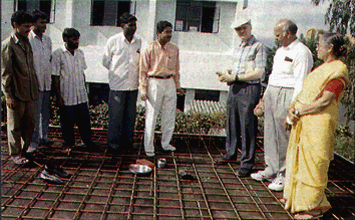
|
|

|
|
David Oke ready to break coconut prior to pouring concrete over the roof
of the school building for mentally challenged
|
|

|
|
Heartfelt Thanks to Volunteers
|
|
The following volunteers helped with fundraising activities, raising in excess of $46,000. The actual assistance
to the less privileged will grow manifold through matching funds from the Wild Rose Foundation and the Canadian
International Development Agency (CIDA).
|
|
|
Ramesh & Vijay Aggarwal
|
Ganesh Murdeshwar
|
|
Jyostna Arora
|
Avinash Mujoomdar
|
|
Sandhya & Sujata Bagwe
|
Deepa Murthy
|
|
Sunil Bagwe
|
Sim Murthy
|
|
Viren Bhatnagar
|
Amit Nakhwa
|
|
Krishan Chawla
|
Pratima Pandit
|
|
Jaydeep Deshpande
|
Madan Prasad
|
|
Vasudev Dhodia
|
Rajiv Ranjan
|
|
Arlene Dowhaniuk
|
Angela & Sabena Sehgal
|
|
Suresh & Daksha Jani
|
Madhu & Satish Sehgal
|
|
Kamalakar & Usha Joshi
|
Naresh & Renu Sharma
|
|
Mohan & Monica Juneja
|
Preetam Sharma
|
|
Jivan & Siddhi Kayande
|
Vinod Sharma
|
|
Krishan & Lata Katyal
|
Subhash Sikka
|
|
Vinod Marwaha
|
Jagannath & Raju Wani
|
|
|

|
|
|
|
|
Donations to MSSO are eligible for tax credit
(charity registration No. 10765 4410 RR 0001).
You may send your donations and/or requests
for MSSO videos to:
|
|

|
|
|
Maharashtra Seva Samiti Organization
4 Strathbury Circle SW
Calgary, Alberta
Canada T3H 1P7
Phone (403) 288-0048 Fax (403) 547-5471
|
|

|
|
|
|
|
|
|
|